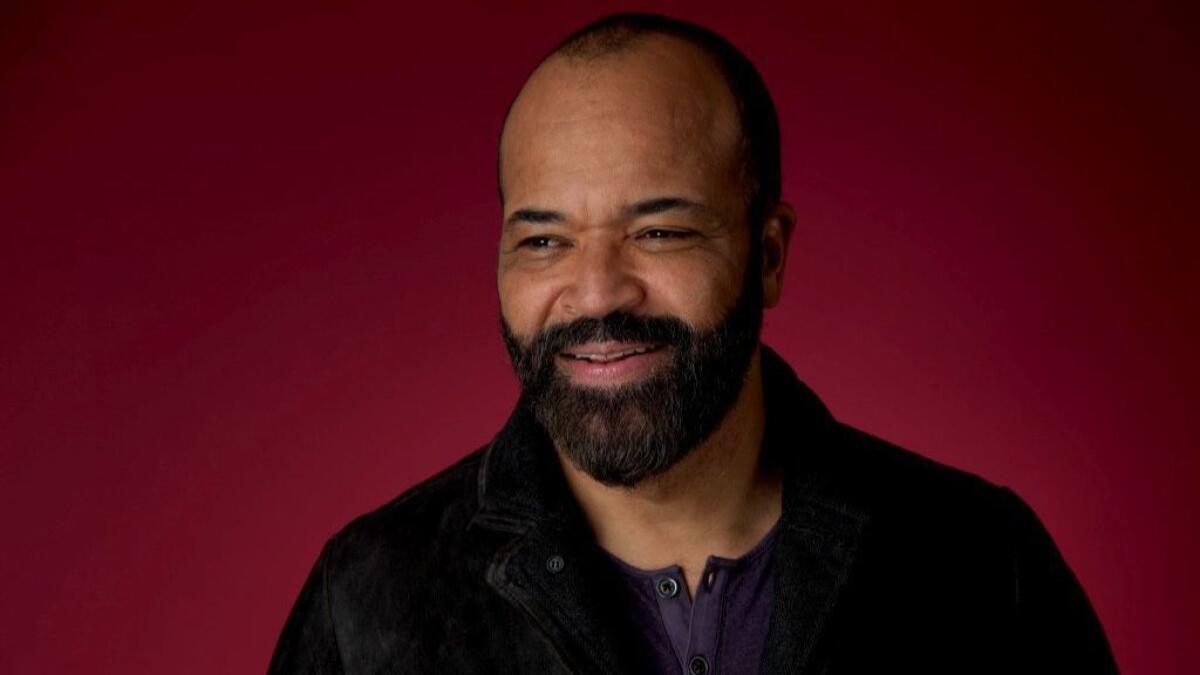Sure, ‘Westworld’ has drama and action, but it’s really about the human condition, says star Jeffrey Wright

- Share via
Nothing is as it seems in “Westworld,” HBO’s hit series set in a fictional amusement park where mechanized hosts fulfill the whims of human guests. No one is more aware of the deep thought and sleuthing skills the show requires of its fervent audience than Jeffrey Wright, who plays the park’s co-creator, Arnold, and his posthumous robotic double, Bernard.
“We really give our audience credit, especially in this time where so much messaging is designed to appeal to the lowest common denominators within us, speaking down to us and assuming the low intelligence of an audience,” said Wright on a recent visit to The Times video studio. “We don’t do that. We challenge the audience. And they challenge us.”
“Westworld,” now in its second season, explores human consciousness, the notion of free will and what happens when robots revolt. But it’s Wright and his costars, Evan Rachel Wood (as Dolores), Thandie Newton (Maeve) and Ed Harris (William), who bring these stories to life in one-hour episodes that both entertain and horrify.
Here are excerpts from that conversation, edited for clarity and length.
Going into this season, one of my colleagues interviewed Evan Rachel Wood, and she was talking about how last season when she talked to you on camera as Dolores it was often with you as Arnold. This year, it’s much more Bernard, and she said it is like two totally different people.
This year is the first time that we do see Bernard and Dolores together as the story evolves. I love working with Evan; I just love the kind of intimacy that we’ve explored, and I’ve described it as kind of a dual meditation, those diagnostic scenes between Arnold and her are really intimate and really subtle and nuanced. I find with all of my cast mates different levels and different variety of things to play, but there’s something about the intimacy with her that I particularly enjoy.
And such a phenomenal cast. Thandie Newton is just wonderful.
Yeah. It’s a rare thing, and it’s not just the cast. It’s the writing that we have the pleasure of delivering. It’s the directors that we work with. Our crew. We’re thrilled that we have to stretch ourselves and that we have to bring everything that we’ve done before and then more to the table in order to pull it off. It’s insane, the schedule and the logistics of the show. And we gripe every once in a while. But mostly we love it, and we kind of throw ourselves into our 18-hour days and at the end of it say, “Wow, man. That was something.”
It’s interesting, too, in that there’s so many layers to it. Audiences really love to work at it, try to solve that puzzle. Right now, there’s so much good TV, that could’ve very easily worked against it. But “Westworld” really sucked people in. Why do you think that is?
I think because it is a challenge. The challenge from the first year was resolved in a satisfying way that we’re not here to kind of gratuitously toy with people. But layered into the technology and the narratives that we’re describing, particularly around the technology, are certain mysteries. So if you stay with us and go along for the ride and surrender as we do, then I think the satisfaction will pay off.
The first maybe four or five weeks of filming this season I shot probably seven episodes randomly ordered and not all of which I had fully read because they weren’t fully polished so I got only what I needed. I would do that in the morning, and then I would hop on the 5 in Bernard costume and drive up to the next unit and go, “OK, what the hell am I doing now?”
But I just kind of gave into it. I trust who I’m working with. I trust [showrunners Jonathan Nolan and Lisa Joy] tremendously. It also, in some ways, it reflected Bernard’s place in the story because he’s at a very vulnerable place. His faculties aren’t what they might have been prior to taking the bullet to the hard drive — which can have adverse effects. So, it was a useful exercise to me. I just tried to make it to work and not freak too many people out on the 5 seeing what might be considered an autonomous car driving up the highway in that it was being piloted by —
Someone whose ear is leaking and—
Leaking cortical fluid stuff. Yeah. Hard to find that at the local gas station in L.A. But maybe one day.
There are many shows out there that are reflecting socially or politically where we are, but what “Westworld” looks at is much more the human condition.
I think it does that on several levels. On the basic kind of existential level or on a level that examines the quality of humanness. What are these elements that make us human? What are our drives? What’s your emotional core? All of these things that the hosts are programmed to re-create are metaphors for how we live our daily existences. And so it’s a clever way to draw an audience in, but it’s also a useful metaphor for examining those things that we ask of ourselves: Am I in control of this loop? Is this a satisfying loop? Do I want to break this loop?
WATCH: Video Q&A’s from this season’s hottest contenders »
More to Read
Sign up for The Envelope
Get exclusive awards season news, in-depth interviews and columnist Glenn Whipp’s must-read analysis straight to your inbox.
You may occasionally receive promotional content from the Los Angeles Times.








